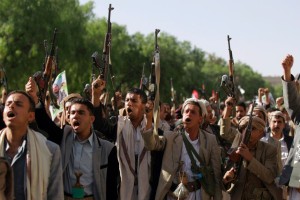Opinion: Diversity and tolerance under siege

Conflict in Yemen
Young Western Bulldogs footballer Lin Jong was the victim of racial abuse from a member of the crowd at the MCG last Saturday night. Jong has a Taiwanese mother and an East Timorese father; and is one of the rising stars of the AFL competition.
Refusing to accept this kind of vilification is still ‘just a part of footy’, another fan at the MCG on Saturday alerted stadium security and an apology was eventually forthcoming from the offending spectator and the Richmond Football Club.
While it is a stretch to argue that incidents at AFL matches are emblematic of global trends, there is an argument that multiculturalism, tolerance and the widespread acceptance of diversity is under siege across the world.
Refugee and migrant communities at home report feeling more isolated and vulnerable since a spate of anti-Islamic ‘Reclaim Australia’ rallies across the country targeted, among other things, halal certification, increased Muslim migration and the wearing of hijabs.
In Germany increasing attacks against asylum seekers in recent months have raised fears that a new wave of racism and xenophobia is about to sweep the nation.
Berlin-based human rights organisation ProAsyl has reported 47 attacks against asylum seekers were recorded in the first four months of the year, which it attributed to “a dramatic increase in growing far-right populist sentiment in society”.
And running concurrently with the spike in attacks on asylum seekers has been the rise of the Pegida movement – a group which opposes multiculturalism and migration programs in Germany.
German Chancellor Angela Merkel’s coalition government and opposition parties immediately condemned the attacks and public demonstrations were held in the town in favour of welcoming refugees. But it is worth remembering that two years ago Merkel herself said “multiculturalism had failed Germany”.
The euro-sceptic right-wing United Kingdom Independence Party (UKIP) has made substantial gains in attracting voters on an anti-immigration platform in Britain and in France the National Front, led by anti-Islamic Marine Le Pen, and which also opposes immigration, also polled strongly recently.
In South Africa at least five people have been killed and hundreds forced to flee their homes this month in one of the country’s worst outbreaks of xenophobic violence in years in the coastal city of Durban.
Some South Africans have accused immigrants of taking jobs and opportunities away from them. The latest violence followed reported comments by Zulu King Goodwill Zwelithini, an influential figure among the Zulu ethnic group, that foreigners should “pack their bags” and leave.
A series of shootings of black males by police officers in the US has polarised communities there along racial lines to a degree not seen since the 1960s.
President Obama has promised a host of changes to the nation’s police policies and sent his Attorney General Eric Holder to cities around the nation to try to improve police relations with minority neighborhoods.
But the greatest example of a broad rejection of diversity and tolerance can been seen in the Middle East; in the interminable conflict between Sunni and Shia Muslims most recently and starkly manifest in ISIS conflict in Syria and Iraq.
This deepening and potentially catastrophic rift between Sunni and Shia has taken on an even more worrying iteration in Yemen.
There the rival protagonists are backed unashamedly by the extremely powerful and politically ambitious nations of Saudi Arabia and Iran.
Oil rich Saudi Arabia is spending billions on its military hardware, some of it now tasked with helping the beleaguered Sunni-dominated Yemeni government while Iran has sent warships to help the Shia Houthi rebels.
In an imbroglio reminiscent of the “Great Game” played out in Afghanistan between Great Britain and Russia more than a hundred years ago, Saudi Arabia and Iran are engaged in their own decades-long strategic rivalry for power and influence in the Middle East, stretching from the Mediterranean Sea to the Gulf and Arabian Sea.
It is built mostly along sectarian and ideological lines – Saudi Arabia as the leader of the Sunni Muslim world, and Iran as the leader of the Shia Muslim world.
Significantly, Iran has just agreed to limit its controversial nuclear program to civilian power generation and submit to international inspections in return for the easing of economic sanctions.
But the hawks in the media here and in the US are saying President Obama and his western allies have been duped by the Iranians, who have no intention of walking away from their nuclear weapons program.
Israel, which also opposes the nuclear deal with Iran, has recently begun sending thousands of Somali and Eritrean asylum seekers back home with Prime Minister Benjamin Netanyahu calling them “a threat to the social fabric of society, our national security, our national identity… and… our existence as a Jewish and democratic state.”
So, what is emerging in the Middle East is a complicated picture of proxy conflicts made more complex by conflicting interests among western powers, Russia and China.
The result of all this is a drift away from negotiated settlements, tolerance and the acceptance of differences – and the rise of hard-line, uncompromising positions all round in a winner-takes-all contest that has led to significant levels of human misery and appalling loss of life on the streets.
The philosopher Edmund Burke, who was an early supporter of cultural diversity in his backing of the American revolutionaries and Catholic emancipation, is supposed to have said: “The only thing necessary for the triumph of evil is that good men should do nothing.”
So it’s encouraging that some world leaders at least – just like the outraged fan at the MCG on Saturday night – are standing up against intolerance and bigotry and shouting down those who would attempt to diminish the humanity of people on the grounds of their race or religion.
Laurie Nowell
AMES Senior Journalist












